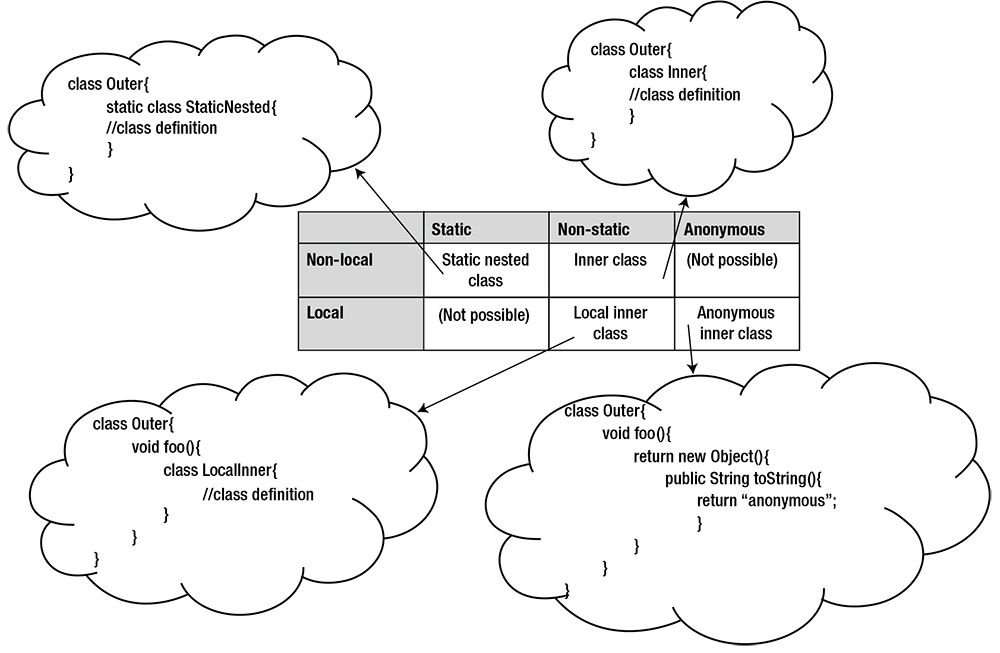| Lesson 6 | Types of Nested Classes |
| Objective | Outline the 4 types of nested classes in Java.. |
Types of Nested Classes
There are four types or flavors of nested classes in Java:
- Static nested class
- Inner class
- Local inner class
- Anonymous inner class

| Static | Non-static | Anonymous | |
| Non - local | Static Nested Class | Inner Class | (Not Possible) |
| Local | (Not possible) | Local inner class | Anonymous Inner Class |
- A non-local class is defined inside a class.(Regular Inner Class)
- A Method-local Inner Class is defined within a code block (either a 1) method, 2) constructor, or 3) initialization block)
- An anonymous Inner Class, does not provide the name of the class; you just define its body.
- A static class is qualified using the static keyword, whereas a non-static class does not use the static keyword with the class definition.
One structure that you can create using static nested classes is to have a static subclass extend a static parent class. The following link Static Inheritance gives an example of how this is accomplished.
Static Inheritance using static Nested Classes
You can define a class as a static member inside another class.
The following example demonstrates how a static subclass can extend a parent class that is also declared as static, provided both are contained within a regular class.
In this case 1) Sub and 2) Super are static nested classes of the RegularClass.
static class Sub extends Super and compiles.
The following example demonstrates how a static subclass can extend a parent class that is also declared as static, provided both are contained within a regular class.
In this case 1) Sub and 2) Super are static nested classes of the RegularClass.
static class Sub extends Super and compiles.
package com.java.nestedclasses;
public class RegularClass {
static class Super {
void myMethod() throws Exception {
throw new Exception("throw exception within static parent..");
}
}
static class Sub extends Super {
void myMethod() {
System.out.println("My method");
}
}
public static void main(String[] args) {
new Sub().myMethod();
}
}
/*
Program Output
My method
*/
Member Class Declarations
- Member class declarations describe nested classes that are members of the surrounding class.
- Member classes may be static, in which case they have no access to the instance variables of the surrounding class; or they may be inner classes .
- Method declarations describe code that may be invoked by method invocation expressions.
- A class method is invoked relative to the class type; an instance method is invoked with respect to some particular object that is an instance of a class type.
- A method whose declaration does not indicate how it is implemented must be declared abstract.
- A method may be declared final, in which case it cannot be hidden or overridden.
- A method may be implemented by platform-dependent native code.
- A synchronized method automatically locks an object before executing its body and automatically unlocks the object on return, as if by use of a synchronized statement , thus allowing its activities to be synchronized with those of other threads.
To get you started, here is a question dealing with inner classes and interfaces.
Which of the following options can be a part of a correct inner class declaration
or a combined declaration and instance initialization ?
(Assume that SimpleInterface and ComplexInterface are interfaces.)
Select 2 options:
Answer: a, b
Explanation:
c. You cannot pass parameters when you implement an interface by an anonymous class.
d. A final class can never be abstract.
e. The implements keyword is used only in a class definition and not during instantiation.
Which of the following options can be a part of a correct inner class declaration
or a combined declaration and instance initialization ?
(Assume that SimpleInterface and ComplexInterface are interfaces.)
Select 2 options:
- private class C { }
- new SimpleInterface() { //valid code}
- new ComplexInterface(x) { //valid code}
- private final abstract class C { }
- new ComplexClass() implements SimpleInterface { }
Answer: a, b
Explanation:
c. You cannot pass parameters when you implement an interface by an anonymous class.
d. A final class can never be abstract.
e. The implements keyword is used only in a class definition and not during instantiation.